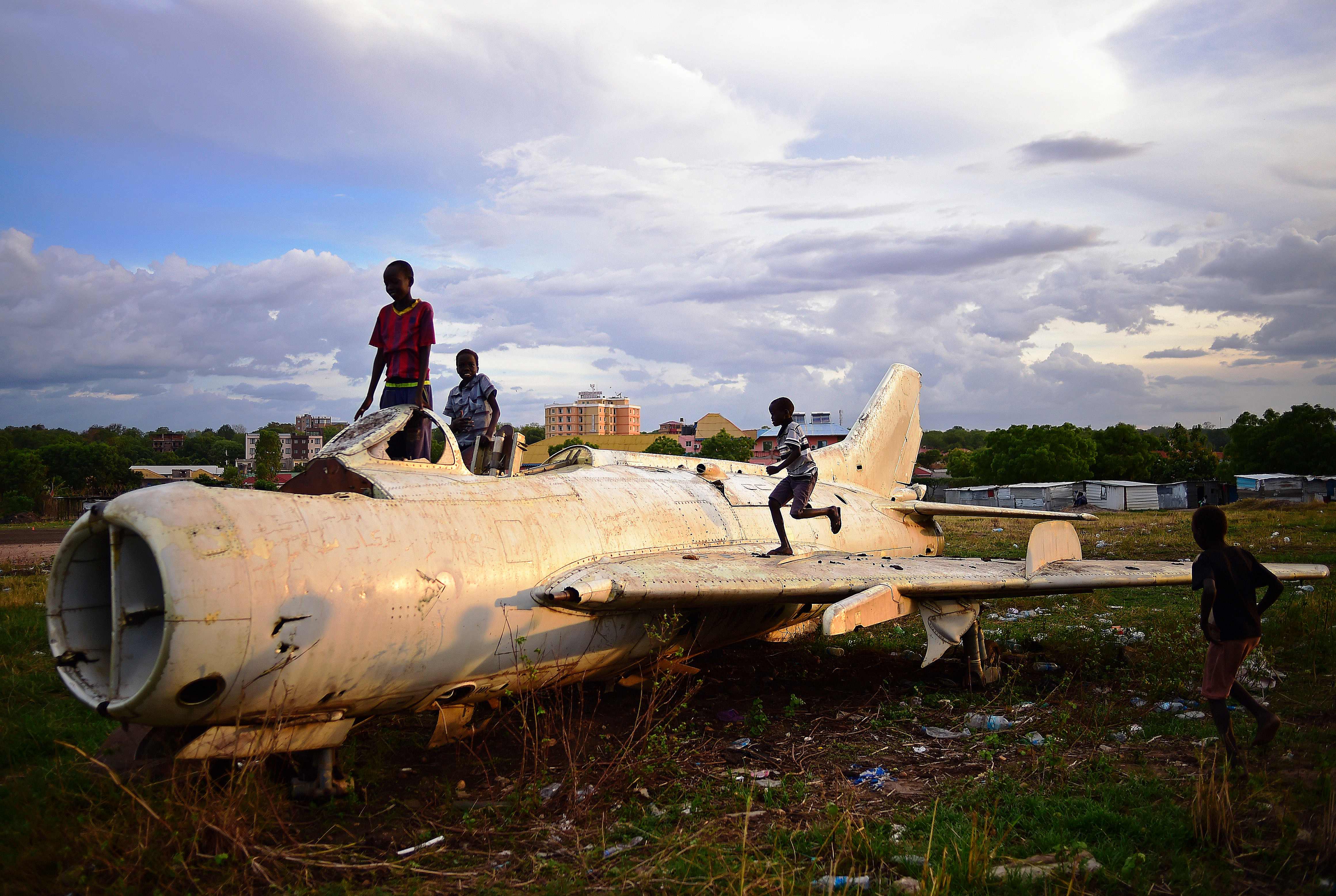JUBA, South Sudan — James Ukongo Uber, 13, is an orphan who works as a shoeshine boy to pay for his uniform, paper and pencils and other fees to attend school. He raised $1 from panhandling to buy black polish and a brush to "polish big people's shoes."
It’s a desperate life, but James is one of the lucky children in this poor, war-ravaged East African nation. South Sudan is home to the world's highest proportion of children without an education. Half the school-age population — more than 1.8 million children — doesn’t attend school, according to UNICEF.
Angelina Adong, 11, was forced to drop out of school to look after younger siblings and help her mother sell ground nuts and sesame-seed cakes.
Those who stay in school face dangers. Daniel Bior Chol, 19, hid in the rushes of the Nile River to escape gunmen who kidnapped him and four other high school students last month as they walked home. Two of the students are still missing.
Children are denied schooling for reasons that range from traditional beliefs that girls should not get an education to South Sudan's civil war, which has forced an estimated 800 schools to close.
South Sudan gained independence from Sudan in 2011. Two years later, a civil war erupted between supporters of President Salva Kiir and his former vice president, Riek Machar. On Tuesday, Machar returned to Juba and was sworn in again as vice president as part of a fragile peace deal signed in August.
The war, often along ethnic lines, wrought havoc on the country. More than 2 million people were displaced. Almost half the population, 5.8 million people, faces hunger, the United Nations estimates. Falling oil prices hurt the country's main source of revenue.
The boys and girls who do go to school face tough conditions and few resources, but they're determined to learn.
![SSUDAN-EDUCATION [image : 83552018]](http://www.gannett-cdn.com/-mm-/6a45aeb65e99c26f4df901e5f19b83460697a13c/c=358-0-4738-3744/local/-/media/2016/04/26/USATODAY/USATODAY/635972780438752421-GettyImages-483475801.jpg)
"Many schools are organized in temporary shelters or under trees, and only two-thirds of them have sanitation or water points,” said Tizie Maphalala, a UNICEF education manager. "Teaching materials remain another challenge."
Mary Kiden Yohana, 14, a student here in the capital of Juba, explained it bluntly: "Even if there is no food, we have a right to get an education.”
South Sudan Education Minister John Gai Yoh said, "Education is a tool that can be used to stop war, and our children are saying we cannot continue like this."
Mary Adum Bol, 27, a widow, struggles to keep her four children in school.
"I do petty jobs like sweeping government offices and also sell some produce — greens, okra, tomatoes — to get a little money to support my family and pay school fees," she said.
In Mahad — a camp housing 9,000 people who fled to Juba to escape the fighting — teacher Mayen Kur said a single classroom caters to students ages 3 to 17.
![AFP 551182891 I CIU SOU [image : 83551686]](http://www.gannett-cdn.com/-mm-/8897e787d3bc6a7e7c1bdad249cc07b79c922ad0/c=66-0-3709-3114/local/-/media/2016/04/26/USATODAY/USATODAY/635972777874095981-2-JUBA.jpg)
“There is no proper teaching or learning being done," he said. "We just teach them some alphabetical letters and mathematical numbers to keep them occupied.”
Girls have even less access to education because of cultural barriers. Primary schools have seven girls for every 10 boys. The ratio falls to 5-to-10 at secondary schools. In 2013, just 500 girls in the whole country were in the final year of high school.
Safety is another hurdle. “One of the main issues is the distance to school, especially for girls who cannot, due to security reasons, walk long distances," said Maphalala, the UNICEF manager.
Abductions of both boys and girls became common during the conflict.
Chol was one of the five students grabbed by gunmen last month when they paused to buy mangoes while walking home from high school in a Juba suburb.
“They took us into their home, and inside their house, they beat us seriously. They covered our eyes and put us in a car. They took us and threw us into the River Nile," he said. "They were shooting at us in the water. I escaped. I went into the grasses in the water and hid."
Eight people have been arrested in connection with the abduction, said Lt. Col. Akok Akok Kiir of the local highway police. But there’s been little progress in finding the two missing students.
John Mabior Deng, 12, who attends school in the Mahad refugee camp, hasn't given up hope.
"We want to learn, even during war," he said. "Education will be the only thing to get us out of this situation.”
![South Sudan Overview [oembed : 83543534] [oembed : 83543534] [oembed : 83543534] [oembed : 83543534] [oembed : 83543534] [oembed : 83543534] [oembed : 83543534] [oembed : 83543534] [oembed : 83543534] [oembed : 83543534] [oembed : 83543534] [oembed : 83543534] [oembed : 83543534] [oembed : 83543534] [oembed : 83543534] [oembed : 83543534] [oembed : 83543534] [oembed : 83543534] [oembed : 83543534] [oembed : 83543534] [oembed : 83543534] [oembed : 83543534] [oembed : 83543534] [oembed : 83543534] [oembed : 83543534] [oembed : 83543534]](/Portals/_default/Skins/PrestoLegacy/CommonCss/images/smartembed.png)
![Gannett-cdn [oembed : 83612550] [oembed : 83612550] [oembed : 83612550] [oembed : 83612550] [oembed : 83612550] [oembed : 83612550] [oembed : 83612550] [oembed : 83612550] [oembed : 83612550] [oembed : 83612550]](/Portals/_default/Skins/PrestoLegacy/CommonCss/images/smartembed.png)


![635972782185963621-SSD160425001.JPG [image : 83552180]](http://www.gannett-cdn.com/-mm-/442152d93783601841080ac91db5a2abf9ae0192/c=61-0-938-750/local/-/media/2016/04/26/USATODAY/USATODAY/635972782185963621-SSD160425001.JPG)
